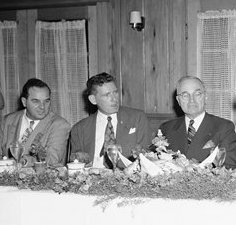The unanimous Supreme Court decision in Pennekamp v. Florida, 328 U.S. 331 (1946), overturned a contempt citation that a Florida court had issued to an editor of the Miami Herald, which had published two editorials and a cartoon criticizing the court’s handling of criminal cases. The Court found that the work published did not pose a clear and present danger and that the contempt citation violated the First Amendment.
Florida Supreme Court upheld contempt citation for Miami Herald
A Florida state trial court found editor John Pennekamp and the Miami Herald in contempt. The Florida Supreme Court affirmed the contempt citations and rejected the First Amendment defense.
Supreme Court overturned the citation
Pennekamp and the newspaper appealed to the Supreme Court. Justice Stanley F. Reed wrote the majority decision, finding that the materials in question had not posed a clear and present danger to the administration of justice in a pending case.
Although the editorials were not balanced, they were not intended to interfere in an ongoing case. Reed observed that “free discussion of the problems of society is a cardinal principle of Americanism. . . . Freedom of discussion should be given the widest range compatible with the essential requirement of the fair and orderly administration of justice.” The decision relied on Bridges v. California (1941).
Concurring opinions warned against restricting the press
Justice Felix Frankfurter wrote a long concurring opinion warning against elevating Oliver Wendell Holmes Jr.’s “clear and present danger” test into dogma. Frankfurter observed, “A free press is vital to a democratic society because its freedom gives it power. Power in a democracy implies responsibility in its exercise.” In the present case, Frankfurter did not believe that the materials at issue were designed to interfere with a pending case.
Justice Frank W. Murphy concurred, writing that affirming the conviction “would be approving, in effect, an unwarranted restriction upon the freedom of the press.”
Justice Wiley B. Rutledge also concurred, noting that newspapers often published carelessly, hastily, and ignorantly about the law. Thus, “any standard which would require strict accuracy in reporting legal events . . . would be an impossible one.” The materials that exceeded the boundary of “fair comment” in the present case had not blocked or obstructed “the functioning of the judicial process.”
Justice Robert Jackson did not participate in this case.
John Vile is a professor of political science and dean of the Honors College at Middle Tennessee State University. He is co-editor of the Encyclopedia of the First Amendment. This article was originally published in 2009.

